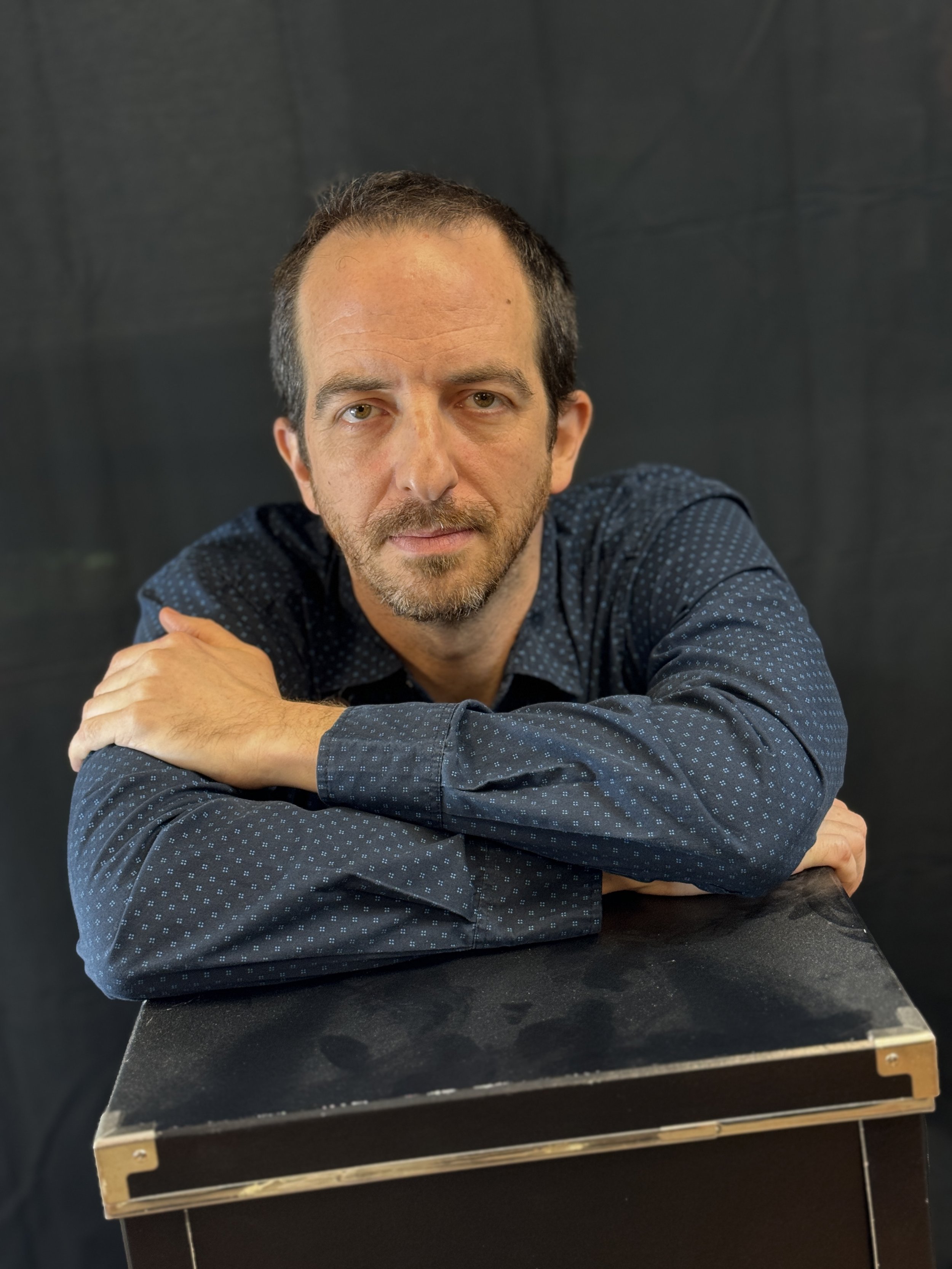A Real Page-Turner
By Emily Raij
I n 2011, Ilan Grapel was a 27-year-old law student fluent in English, Hebrew, and Arabic who wanted to use his legal and language knowledge to help refugees in Egypt. Born and raised in Queens, New York, to a Jewish American mother and a Jewish Israeli father, Ilan has dual Israeli-American citizenship. He had previously worked as an Arabic translator with the Australia/Israel & Jewish Affairs Council (AIJAC) in Melbourne after completing his mandatory service with the Israel Defense Forces (IDF).
“I wanted to apply my Arabic outside of the military,” says Ilan, who spent summers visiting family in Israel and studied abroad there his junior year of college.
Ilan graduated from Johns Hopkins University in 2005 with a bachelor’s degree in international relations and economics before serving in the IDF during the 2006 Israel-Hezbollah War, also known as the Second Lebanon War.
While serving as a paratrooper, Ilan was wounded by Hezbollah forces on August 1, 2006. Fortunately, he recovered quickly, finished another half-year with the IDF, and then returned to the United States to attend law school at Emory University.
During his first summer of law school, Ilan worked for the Israeli Supreme Court through a public interest fellowship from Emory. The next summer, through the same fellowship, he was selected to work with Saint Andrew’s Refugee Services, a nongovernmental organization (NGO) providing legal aid to help resettle refugees. Ilan began working with asylum seekers from Sudan beginning in May of 2011.
“I got accepted and then the Arab Spring [uprisings] broke out in January of that year, so I was worried that it would disrupt my plans,” says Ilan. “But I was in Egypt a few times beforehand [primarily for study] and had connections from previous visits, so I knew my way around for the most part. I knew where the danger could be.”
Ilan Grapel, a math and computer science teacher at Seminole High School, was once embroiled in a diplomatic incident in Egypt – where he was held captive for months.
A Harrowing Experience
Still, Ilan, now a resident of Winter Springs, never could have predicted what happened next. In the early morning hours of June 12, 2011, plainclothes Egyptian security officers took him from the hostel where he was staying, transported him in an unmarked van to a prosecutor’s office, and interrogated him in Arabic.
He had been accused of being an Israeli spy, providing intelligence to Mossad, and participating in – even inciting – the revolt against former Egyptian president Hosni Mubarak.
With a transcriptionist writing by hand, no computers, and cigarette smoke filling the room, Ilan described the situation as being “like a movie from the 1950s.” He had gone to Egypt to learn about other cultures and help people, and he says he “had more positive interactions than negative.” But his presence in Cairo had attracted attention.
“I guess I was considered an unusual case because I spoke Arabic,” says Ilan. “There were a lot of Egyptians that were intrigued to speak with me. If I thought someone was more or less safe, I wouldn’t conceal that I had an Israeli background. If I were a spy like they eventually claimed, it would lend credit to the fact I was there and not trying to hide anything.”
At first Ilan thought he would be released relatively quickly through the help of the U.S. Embassy or State Department. But when that didn’t happen and a few days turned into a few weeks of interrogations, Ilan realized the situation was worse than he initially thought. As he waited, fear of the unknown set in.
“I could theoretically be transferred to much worse conditions,” he says. “I read books about prisoners who went through torture – I could be placed in a similar situation.”
Ilan remained in solitary confinement, interrupted only every couple of weeks by a visit with the Egyptian prosecutor and a representative from the U.S. Embassy to prove he was being fed and taken care of. Ilan asked for books to keep busy, but he received only one or two at a time, some Sudoku puzzles, and Egyptian newspapers with anything related to the Middle East cut out of them. That was only enough to get through a few hours of the day.
Keeping Hope Alive
“The hope ebbed and waned and wasn’t always there. I knew as long as I wasn’t officially indicted and a court date was not actually set up…the fact that it was being delayed meant they were trying to find a remedy to the situation,” explains Ilan.
“The hope ebbed and waned and wasn’t always there.”
In mid-October, he was taken to a different room, where he was able to meet a lawyer of Prime Minister Benjamin Netanyahu and a member of the Knesset after having no contact with Israelis for months. Ilan noted that there were no Egyptian officers in the room, although he assumed they were listening in. The visit with the Israeli representatives felt positive, and they took a picture of Ilan to show people back home he was healthy.
“They wanted to see how I was doing and wanted to encourage me that there was hope,” says Ilan. “They thought they could find resolution within a short time.”
However, after Ilan was taken back to his cell, his reading material slowed and he stopped receiving newspapers altogether.
“I thought something went awry…they called me and said ‘time for your last meal.’ Then they brought me pizza, and it seemed celebratory. I still was not sure what that could mean, but it seemed like a change,” Ilan remembers.
Israeli Prime Minister Benjamin Netanyahu greets Ilan Grapel after his release from Egyptian custody.
Next, Egyptian security put him in the van he was originally taken in, but this time without the handcuffs or blindfold he was used to wearing during transport.
“I could see my surroundings for the first time. Eventually, we arrived at a grassy knoll. They said, ‘We part ways here,’ opened the door, and told me to get out. A private plane was there with two Israelis who came out and gave me an Israeli newspaper cover story with my photo from a couple days prior that explained it all. I went on the plane, took off, and then I realized I was free,” says Ilan.
Safe and Sound
That was October 27, 2011. Ilan had been released in exchange for 25 Egyptian prisoners. After landing in Israel, Ilan was greeted by his mother and New York Congressman Gary Ackerman, whom he had interned with in Queens during the summer of 2002 and who had appealed for his release.
Ilan was taken to Prime Minister Netanyahu’s office, where he was debriefed before speaking at a press conference to thank those responsible for his release. Ilan returned to the United States with Congressman Ackerman. At the time, the turn of events seemed surreal to Ilan.
“The release was a sharp transition from the danger of prison to two days of debriefings and political meetings, to going back to dealing with the real world,” recalls Ilan.
More than a decade removed from the incident, Ilan’s wife Michal now serves as director of Hebrew studies at Jewish Academy of Orlando, and Ilan teaches Math at Seminole High School and computer science to online students around the world. The couple and their six-year-old son have lived here for nearly two years.
The switch from legal work to teaching math and computer science may seem surprising, but Ilan says he “always liked languages, human or computer, and math kind of also fits in there somehow.”
Ilan says he also needed a break from the NGO world that “was really saturated with preconceived notions and politics and subjectivity. I like that math is less subjective…and more insulated from harmful political biases.”
Reflecting on how his own life has changed since his release, Ilan says he still travels, “but not in problematic regions related to the Israeli conflict.” He has also learned a lot from the current Israeli captives’ experiences about how to express himself.
“Only with the recent circumstances was I able to recount things, through other people telling their stories,” says Ilan. “I’m not sensitive. My own experience wouldn’t hurt me at this point. The released hostages are thankful and positive. I am still hoping for more through a fair and secure exchange.”
This story was originally published in print in Spring 2024.


